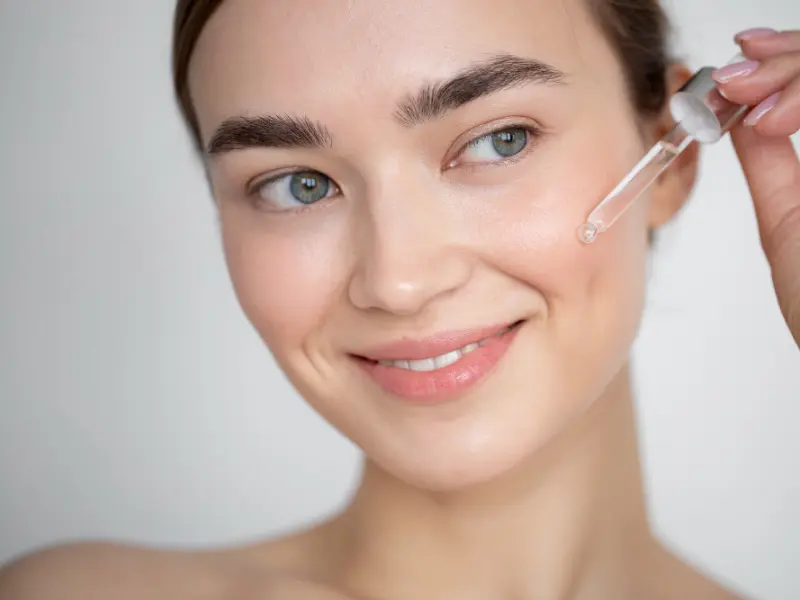Does Hyaluronic Acid Cause Acne?
Published: 23 Mar 2025
Breakouts are frustrating enough without skincare making them worse. If you’ve just added a new product and are suddenly seeing pimples, you might be asking: Does hyaluronic acid cause acne?
Don’t worry, this guide will walk you through the real reasons behind breakouts and how to protect your skin while staying moisturized.
1- Can Hyaluronic Acid Cause Acne?
No, hyaluronic acid does not directly cause acne. It is a hydrating ingredient that helps maintain skin moisture without clogging pores. (1)
However, some people experience breakouts after using HA products. Why? Let’s break it down.
| 1.1 Why Do Some People Break Out After Using Hyaluronic Acid? |
|---|
1.1.1 Low-Quality Products
1.1.2 Incorrect Application
 1.1.3 Reaction to Added Ingredients
|
Wondering if your product is to blame? Keep reading. The next part will show you how to pick the right hyaluronic acid.
| 2- How to Use Hyaluronic Acid Without Causing Breakouts |
|---|
Using hyaluronic acid the wrong way can lead to dryness, irritation, or even breakouts—but when used correctly, it can be a game-changer for your skin. Here’s how to make the most of it without clogging pores or worsening acne. 2.1 Choose the Right Product
2.2 Apply It the Right Way
2.3 Patch Test Before Full Use
 2.4 Pair It Wisely with Other Products
|
3- Hyaluronic Acid and Acne-Prone Skin: Benefits and Misconceptions
Hyaluronic acid is often misunderstood in the acne community. Some fear it might worsen breakouts, while others think of its hydrating and soothing properties. Let’s clear up the confusion.

3.1 Benefits of Hyaluronic Acid for Acne-Prone Skin
- Keeps Skin Hydrated Without Causing Oiliness
- Acne-prone skin is often dehydrated, especially if you use strong acne treatments. HA attracts moisture without making your skin greasy.
- Acne-prone skin is often dehydrated, especially if you use strong acne treatments. HA attracts moisture without making your skin greasy.
- Strengthens the Skin Barrier and Reduces Inflammation
- A weak skin barrier makes acne worse. HA helps repair and protect the barrier, reducing redness and irritation.
- A weak skin barrier makes acne worse. HA helps repair and protect the barrier, reducing redness and irritation.
- Works Well with Acne Treatments
- Strong acne treatments like benzoyl peroxide, retinoids, and salicylic acid can cause dryness and peeling. HA helps counteract this without interfering with treatment effectiveness.
4- Real-Life Stories and Experiences
Many skincare lovers on Reddit shared surprising experiences that raise the same question: Does hyaluronic acid cause acne? One user had combination skin and loved experimenting with new products.
After adding hyaluronic acid serums from The Ordinary and Makeup Revolution to their routine, they noticed a sudden breakout along their jawline that hadn’t happened in nearly a year. They wondered if hyaluronic acid could be the reason.
Others agreed:
- “TO hyaluronic surely broke me out!” said one user with dry, acne-prone skin. Their acne cleared up soon after they stopped using the HA serum.
- Another user shared, “I thought I was crazy because everyone says HA is the best. I stopped using it, and now my skin is calming down.”
- Some pointed out that maybe it’s not the hyaluronic acid itself but other ingredients (like pentylene glycol) in the formula that triggered the breakouts.
At the same time, a few users felt HA shouldn’t cause acne because it’s usually non-comedogenic (meaning it shouldn’t clog pores).
While hyaluronic acid is praised for hydration, for some people, it might be a hidden trigger for breakouts, either because of the product’s formulation or how their skin personally reacts.
Curious to learn more? Check out our next article on
4- Conclusion
So, guys, in this article, we’ve covered the question Does Hyaluronic Acid Cause Acne? in detail. To sum it up, HA itself doesn’t cause breakouts, but the wrong formulation or improper use might lead to issues.
My advice? Stick to a high-quality, non-comedogenic HA serum and always follow up with a moisturizer to seal in hydration. If you have acne-prone skin, avoid HA products with heavy oils or silicones.
Found this helpful? Share it with a friend who’s scared of trying HA
5- FAQs
No, hyaluronic acid itself doesn’t cause acne. However, if your HA product contains comedogenic ingredients or is used incorrectly (like on dry skin without a moisturizer), it may lead to breakouts. Always check the ingredient list and apply HA on damp skin for best results.
Yes! HA is lightweight, non-greasy, and hydrates the skin without clogging pores. Just make sure to choose an oil-free, fragrance-free formula to avoid irritation.
No, pure hyaluronic acid is non-comedogenic, meaning it won’t clog pores. But some HA serums contain oils, silicones, or thickening agents that might be problematic for acne-prone skin. Always read the label before buying.
Yes, it can! HA keeps your skin hydrated, which helps speed up the healing process of acne marks and reduces dryness from acne treatments. But it won’t directly kill acne-causing bacteria.
No, HA does not cause purging because it doesn’t exfoliate the skin. Purging happens with active ingredients like retinoids or AHAs/BHAs. If you notice breakouts, it might be due to other ingredients in the product.
Apply HA before moisturising while your skin is still damp. This helps HA pull in moisture and keep your skin hydrated. Then, seal it in with a good non-comedogenic moisturizer.
Yes! HA is great to pair with acne treatments because it prevents excessive dryness and irritation. Just apply your acne treatment first, let it absorb, and then follow with HA and moisturizer.
Not directly, but it supports overall skin health by keeping it hydrated. If you struggle with blackheads, pair HA with exfoliating acids like salicylic acid for better results.
If you notice breakouts after using a new HA product, check the ingredient list for oils, fragrances, or silicones. Try switching to a simple, pure HA serum and see if the breakouts stop. Always do a patch test before using any new product.
Yes! HA is gentle and safe for daily use, even twice a day. Just make sure to apply it on damp skin and follow with a moisturizer to prevent dehydration.
References
At MedicaWire, all medically sensitive content is reviewed by licensed healthcare professionals. Our team ensures that the information you read is accurate, up-to-date, and based on trusted medical sources.
Learn how we maintain high standards by reading our Editorial Policy.
📚 Sources
1- Behrangi E, Dehghani A, Sheikhzadeh F, Goodarzi A, Roohaninasab M. Evaluation and comparison of the efficacy and safety of cross-linked and non-cross-linked hyaluronic acid in combination with botulinum toxin type A in the treatment of atrophic acne scars: A double-blind randomized clinical trial. Skin Res Technol. 2024 Jan;30(1):e13541. doi: 10.1111/srt.13541. PMID: 38174839; PMCID: PMC10765352.
https://pubmed.ncbi.nlm.nih.gov/38174839/
2- Dierickx C, Larsson MK, Blomster S. Effectiveness and Safety of Acne Scar Treatment With Nonanimal Stabilized Hyaluronic Acid Gel. Dermatol Surg. 2018 Nov;44 Suppl 1:S10-S18. doi: 10.1097/DSS.0000000000001689. PMID: 30358630.
https://pubmed.ncbi.nlm.nih.gov/30358630/
3- Jung, Yu Ra, Hwang, Chul, Ha, Jeong-Min– Hyaluronic acid decreases lipid synthesis in sebaceous glands. SN – 0022-202X doi: 10.1016/j.jid.2017.01.017
https://doi.org/10.1016/j.jid.2017.01.017
4- Schlesinger, T., & Powell, C. R. (2012). Efficacy and Safety of a Low-Molecular Weight Hyaluronic Acid Topical Gel in the Treatment of Facial Seborrheic Dermatitis. The Journal of Clinical and Aesthetic Dermatology, 5(10), 20. https://pmc.ncbi.nlm.nih.gov/articles/PMC3486775/
ℹ️ Our Promise
MedicaWire follows strict sourcing guidelines and only references peer-reviewed studies, academic institutions, and reputable medical associations. We update content regularly to reflect new health information.

- Be Respectful
- Stay Relevant
- Stay Positive
- True Feedback
- Encourage Discussion
- Avoid Spamming
- No Fake News
- Don't Copy-Paste
- No Personal Attacks



- Be Respectful
- Stay Relevant
- Stay Positive
- True Feedback
- Encourage Discussion
- Avoid Spamming
- No Fake News
- Don't Copy-Paste
- No Personal Attacks




